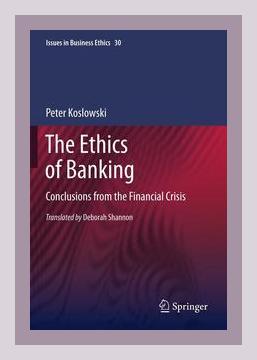Finance, Economics, Trading, InvestingFinancial Ethics and Regulation
Summary of The Ethics of Banking: Conclusions from the Financial Crisis by Peter Koslowski
Introduction
In The Ethics of Banking: Conclusions from the Financial Crisis, Peter Koslowski delves into the ethical dimensions of banking, focusing on the lessons learned from the global financial crisis of 2008. Koslowski offers a profound exploration of how financial institutions must realign their practices to embrace ethical frameworks that prioritize public trust over profit. For anyone interested in understanding the ethical failings that contributed to the financial crisis, this book provides a critical analysis of the moral responsibilities of banks.
Chapter 1: The Financial Crisis and Ethical Deficiencies
Koslowski opens with an analysis of the causes behind the 2008 financial meltdown, highlighting systemic greed and the reckless pursuit of short-term profits. He argues that banking institutions abandoned traditional ethical standards, leading to widespread economic instability. In this chapter, Koslowski emphasizes the importance of ethical principles in maintaining financial stability, stating, “Without a moral foundation, the pursuit of profit leads inevitably to collapse.”
- Key Example 1: Koslowski examines the collapse of Lehman Brothers, pointing to its aggressive investment strategies and disregard for ethical risk management as a key contributor to the crisis.
- Memorable Quote 1: “Trust, once lost, is harder to rebuild than any balance sheet.”
Chapter 2: The Role of Ethics in Banking
This section focuses on how ethical frameworks should be integrated into banking operations. Koslowski contrasts traditional banking practices, which were built on trust and community service, with modern practices driven by speculative gains and complex financial instruments. He makes a compelling case for a return to more transparent and ethical banking systems, invoking historical models like the cooperative banks of Europe.
- Key Example 2: The book discusses the role of ethical banking in mitigating risks, using Germany’s cooperative banking system as a model where local banks were better shielded from the financial crisis due to their ethical business practices.
- Memorable Quote 2: “Ethics in banking is not merely a matter of regulation; it is the lifeblood of sustainable financial systems.”
Chapter 3: Regulatory Failures and Ethical Oversight
Koslowski highlights regulatory failures as a central theme, arguing that governments and international regulatory bodies failed to enforce ethical standards. He critiques the laissez-faire policies that allowed banks to engage in high-risk activities unchecked. Koslowski asserts that the crisis was not only an economic failure but a moral one, as policymakers neglected their duty to protect citizens from corporate excess.
- Key Example 3: He presents a detailed critique of the subprime mortgage market in the U.S., where lenders exploited vulnerable consumers for financial gain, exacerbating the housing bubble and precipitating the financial crisis.
- Memorable Quote 3: “The failure of regulation is the failure of ethics on a macroeconomic scale.”
Chapter 4: Restoring Public Trust in Banks
One of the central questions of the book is how to restore trust in financial institutions. Koslowski argues that trust is the foundation of banking, and without it, the entire system is at risk. He offers a framework for rebuilding this trust through transparency, accountability, and the incorporation of ethical principles in decision-making processes. Koslowski insists that ethical reform must go beyond compliance with laws—it requires a deep cultural shift within banking institutions.
- Key Example 4: The book discusses the Icelandic banking system’s collapse and recovery, emphasizing the need for moral accountability in rebuilding trust with the public.
- Memorable Quote 4: “To restore trust is to restore the very foundation upon which economies are built.”
Chapter 5: The Future of Ethical Banking
Koslowski concludes by presenting a roadmap for the future of banking, advocating for stricter regulations, a renewed focus on long-term stability over short-term gains, and a broader cultural shift toward ethics. He suggests that banks should adopt corporate social responsibility (CSR) models and engage in community-oriented initiatives to demonstrate their commitment to ethical practices. He also stresses the importance of education in finance, proposing that future bankers receive training in ethical decision-making.
- Key Example 5: Koslowski uses the Scandinavian banking systems as an example of how ethical banking practices can be both profitable and socially responsible. These banks showed resilience during the financial crisis due to their conservative, ethics-driven approaches.
Conclusion: Relevance to Today’s Financial World
In the wake of subsequent financial scandals, such as the LIBOR manipulation and the Wells Fargo fraud case, the lessons from Koslowski’s book remain highly relevant. As financial systems continue to evolve in the post-crisis world, The Ethics of Banking serves as a reminder that ethical lapses not only harm economies but also erode public trust in critical institutions. Koslowski’s call for a return to moral foundations is more pressing than ever, as new technologies and financial innovations pose fresh ethical challenges.
SEO Considerations:
- Book Title: The Ethics of Banking: Conclusions from the Financial Crisis
- Author: Peter Koslowski
- Keywords: financial crisis, ethical banking, banking regulation, trust in banking, corporate social responsibility in banking, ethical reform, financial institutions, global financial crisis, subprime mortgage crisis
By incorporating these keywords and focusing on clear sections, this summary not only gives readers a comprehensive understanding of Koslowski’s book but also ensures search engine optimization for a broader audience interested in ethics and banking.
Finance, Economics, Trading, InvestingFinancial Ethics and Regulation
